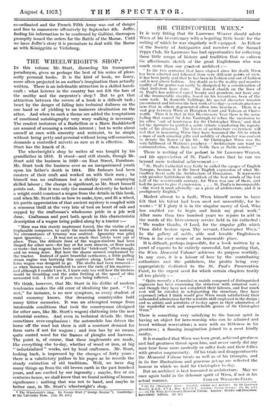SIR CHRISTOPHER WREN.*
IT is very fitting that Sir Lawrence Weaver should salute Wren at his bi-centenary with a beguiling little book' for the writing of which he was singularly well equipped. As Fellow of the Society of Antiquaries and member of the Samuel Pepys Club, Sir Lawrence has had opportunities for collecting those little scraps of history and tradition that so enliven his affectionate sketch of the great Englislunan who was
much more than our greatest architect :—
" In the two centuries that have elapsed since his death Wren has been admired and followed from very different points of view. It has been justly said that he has been in fashion and out of fashion and is now above fashion. Any doubt as to the reality and massive quality of his genius can easily be dissipated by a consideration of what imitators have done. No domed church on the lines of St. Paul's has achieved equal beauty and grandeur, nor have any of the innumerable steeples, based on his inventions, been of the same rank. In domestic buildings, his special character remains pre-eminent and informs the best work of to-day—a certain gracious- ness that in others degenerated often into heaviness. There is a vast gap between Wren at Hampton Court and Tillman at Chats- worth. Thus it is that in this Bicentenary Year there is the same feeling that caused Sir John Vanbrugh to refuse the succession to his office `out of tenderness for Sir Christopher Wren,' and that led the Spectator to publish a noble tribute repudiating the ingrati- tude of his dismissal. The lovers of architecture everywhere will feel that in honouring Wren they have honoured the Art to which a man of such amazing gifts and nobility of character was content to devote the flower of his life. Sir Christopher Wren was the very fulfilment of Wotton's prophecy—' Architecture can want no commendation, where there are Noble Men or Noble mindes.' "
There is nothing of the pedant in Sir Lawrence Weaver, and his appreciation of St. Paul's shows that he can see beyond mere technical achievement :-
" St. Paul's Cathedral may fairly be called the apogee of English Baroque, because it is the finest English expression of what Mr. Geoffrey Scott calls the Architecture of Humanism. It represents with peculiar faithfulness the outlook of the best minds of the last half of the seventeenth century, for Wren was one of them, and had the power to give it expression. . . St. Paul's is incomparable —the word is used advisedly—as a piece of architecture, and it is prodigiously English."
Modest almost to a fault, Wren himself seems to have felt that his talent had been used not unworthily, for he wrote : " If I glory it is in the singular mercy of God, Who
has enabled me to begin and finish my great work." After more than two hundred years we rejoice to acid in the words of the hi-centenary service held in his cathedral : " We render thanks, 0 Lord, for the singular gifts which Thou didst bestow upon Thy servant, Christopher Wren." In the gallery of noble, able and lovable Englishmen Wren is for ever secure of an honourable place.
It is difficult, perhaps impossible, for a book written by a panel of experts to be entirely successful, but granting that,
the Wren Memorial Volume2 achieves its purpose worthily. In any case, it is a labour of love by the contributing authorities and the publishers, the profits being very
appropriately dedicated to the St. Paul's Preservation Fund, to the urgent need for which certain chapters testify all too plainly :-
" Quite recently a Commission mainly composed of distinguished engineers has been examining the structure with minutest care and though they have not completed their labours, and fear much cost will be entailed in safeguarding the structure, they have expressed (what I think would Five Wren much satisfaction) their unbounded admiration for the scientific skill employed in the design ; and so artists and scientists of to-day agree in their admiration of the wonderful work and unquenchable genius of Sir Christopher Wren."
There is something very satisfying to the human spirit in
having an object for hero-worship who can be admired and loved without reservation; a man with no littleness in his
greatness ; a flaming imagination joined to a most kindly sanity. It is remarked that Wren was born great, achieved greatness and had greatness thrust upon him, and never surely did any man bear fame more modestly or suffer fools and their follies
with greater magnanimity. Of his trials and disappointments the Memorial Volume treats as well as of his tritunphs, and
in its fine illustrations and generous get-up are reflected the honour in which we hold Sir Christopher to-day.
But an architect is best honoured in architecture. May we once again build in the debonair spirit of Wren, if not in his
• (1) Sir Christopher Wren : Sciemhd, Scholar an l Architt•cl. By Sir Lawrence Weaver, K.B.E., Hon. A.B..1.11.A. London : George NCWIle8. (7n. 24. net —(2) The Wren Bi-Cemeoary Memorial Volume. London : Hodder and Stoughton, Subscrlbera' Edition. 1£5 6s.1


































 Previous page
Previous page